
Interdom in Ivanovo: Children's "Internationale" of the World's Nations
/ Главная / Russkiy Mir Foundation / Publications / Interdom in Ivanovo: Children's "Internationale" of the World's NationsInterdom in Ivanovo: Children's "Internationale" of the World's Nations
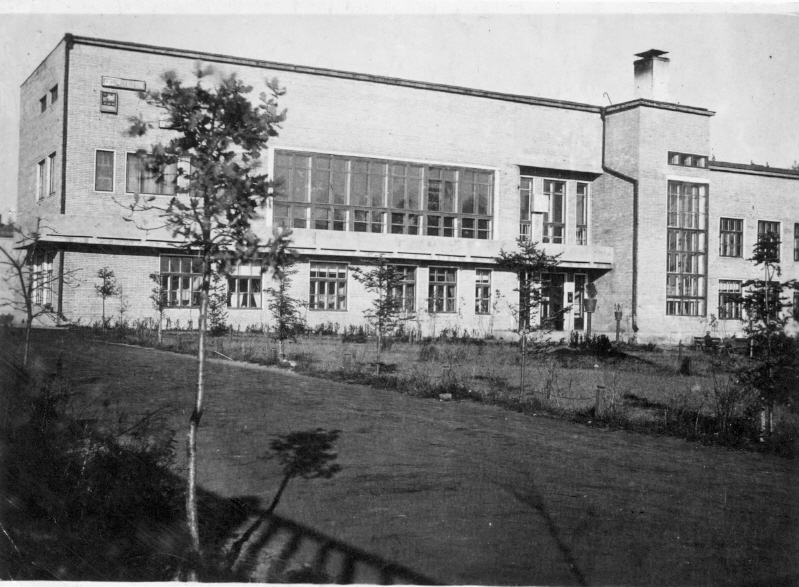
Interdom in Ivanovo, the 1930s. Photo credit: interdomivanovo.ru
The Ivanovo International Children's Home (Interdom) celebrates its 90th anniversary in 2023. It was once very accurately called the "Global Barometer", as children from war-torn countries were brought there. Thousands of foster children from 80 countries have lived there since Interdom began its operation. Sofia Kuznetsova, head of the Interdom School Museum, shared about the unique project, which continues and develops today.
– In 2023, The Ivanovo International Children's Home (Interdom) celebrates its 90th anniversary. How did its story begin? Why did the Soviet Union decide to open a boarding school for children from other countries?
- In 1922, the International Red Aid (also known by the Russian acronym MOPR) was established. It was an organization that provided international aid to revolutionary fighters. The MOPR sections were also set up in Russia, including the MOPR's Provincial Committee in Ivanovo-Voznesensk. Members of the organization campaigned in solidarity with the international proletariat, raised funds for foreign workers, and patronized prisoners of conscience in 27 European prisons.
The fascist military regime was established in a number of European countries in the late 1920s and early 1930s. Back then, a children's home was opened in Germany at the initiative of Ivanovo residents and with their funds. It was a place where German and Bulgarian children of anti-fascist fighters found shelter and safe haven.
In 1929, the Old Bolshevik Society from Ivanovo submitted to the MOPR Executive Committee a proposal to build a children's home in Russia for foreign children whose parents had been victims of the Nazis. This initiative found strong support from Elena Stasova, head of the MOPR executive committee. On August 23, 1929, there was a rally in the center of Ivanovo. It was attended by over 30,000 people. It was decided to build the International Children's Home (ICH) and begin voluntary fundraising. No dime spent on the construction was taken from the government.
– The building was also quite unusual and modern for its time. Was the design specially developed for the children's home?
– The construction of the building began in 1931. It was carried out by Ivanovo workers based on voluntary donations from Ivanovo residents and people from other Russian regions. The building was designed in the Constructionism style by the Moscow architect Nikolai Porkhunov. Seen from above, it resembled crossed hammer and sickle symbolizing the unity of workers and peasants in the socialist state.
The first MOPR international children's home in the USSR was named after Elena Stasova and was unique in terms of its tasks. It was erected on the edge of a pine forest on the banks of the Talka River by May 1, 1933.
– A lot of people have known about the Spanish children from anti-fascist families who were brought to the Soviet Union during the Spanish Civil War. However, there were children from other countries in the children's home, weren't there? How did they bring children here? Who managed it? How many children could stay here at the same time?
– On June 7, 1933, thousands of Ivanovo residents came to the train station to welcome the first Interdom residents. There were 141 boys and 26 girls from Germany, Greece, Austria, Bulgaria, Hungary, Italy, and other countries.
It used to be a closed institution for many years. Children were admitted by the MOPR executive committee. Later, this task was handled by the Soviet Executive Committee of the Red Cross and Red Crescent.
First, the building could accommodate somewhat more than 140 people. However, after the reconstruction in 1988, the Ivanovo boarding school and its dormitory were able to accommodate up to 420 people.
The Ivanovo Interdome has always been called the "Global Barometer". Foster children from 80 countries have stayed here at various times.
Those were children from countries with raging wars, ethnic conflicts, and natural disasters. During the 1930s, it hosted children from Spain, Yugoslavia, Bulgaria, and Germany, as well as children of Chinese revolutionaries. From 1941 to 1945, there were children from the besieged Leningrad and the occupied Soviet territories. From the 1950s to 1990s, there were children from the Chernobyl zone, Yugoslavia, Guinea-Bissau, Latin American countries (Chile, Colombia), and the countries of the Middle East where liberation wars were underway. In the 1990s - 2000s, it was a home for orphans and children left without parental care from 28 regions of Russia, CIS countries, and zones of man-made and environmental disasters.
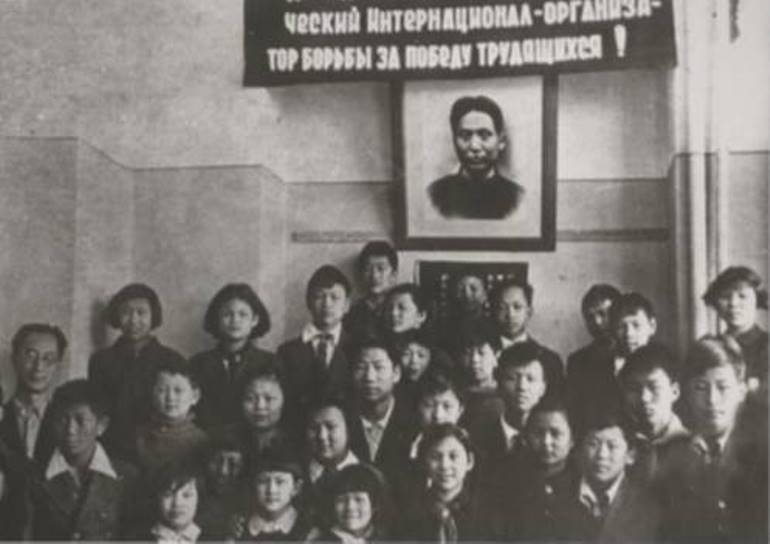
Photo courtesy of Sofia Kuznetsova
– How were the teaching work and educational outreach organized? Were there any special pedagogical approaches for working with such children?
– Interdom was referred to as the House of the Sun from the very beginning. It had a light and warm environment. Each child was treated with care. They felt protected and supported by the warmth of the people around them, the Interdome staff. The children were provided with comfortable bedrooms, playrooms, libraries, assembly and gym rooms, classrooms, a canteen, and a bathhouse. A park was set up in the yard with an area of 4.3 sq. km. (2.7 sq.miles). A greenhouse and premises for pets were built.
The ICH had a school and preschool department since some of the students were just over 3 years old. The children's first mentors were the best educators, including teachers of their native languages who were political refugees.
Interdom is known as a unique place. The Interdom life was described in several documentaries, books, and articles. There are memoirs of its foster children.
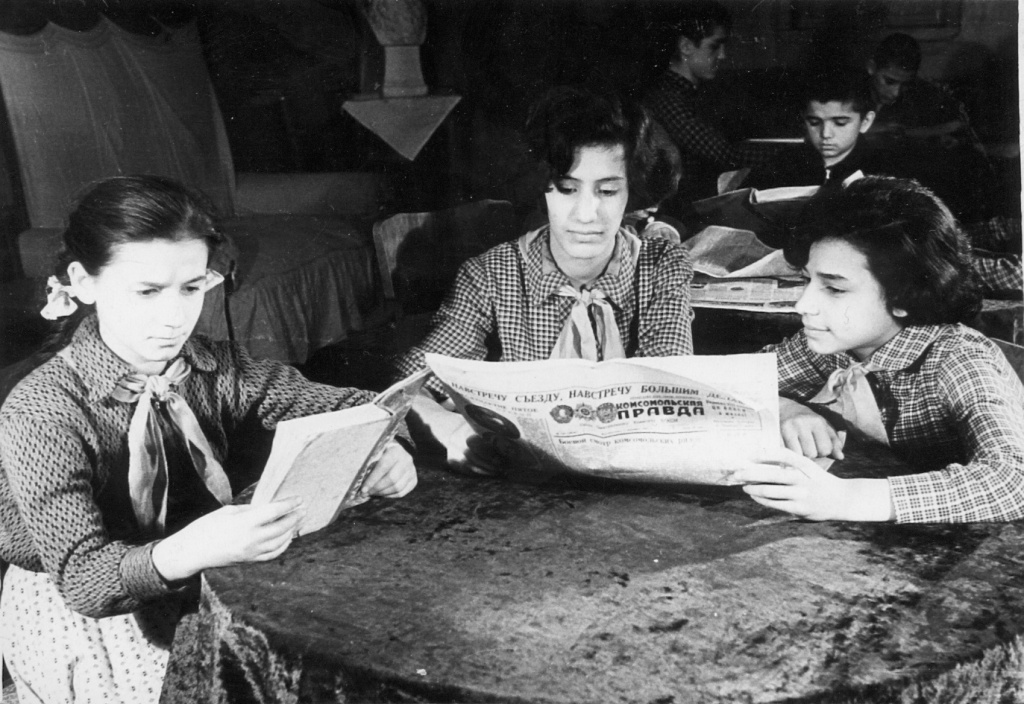
Ivanovo Interdom in the 1950s – 1960s. Photo credit: interdomivanovo.ru
– What was the further fate of those children? Did any of them stay in touch with Interdom in their adult lives?
– This is a huge and fascinating topic of its own. There are many children of well-known people, such as Timur Timofeev, son of Eugene Dennis, General Secretary of the Communist Party of the United States; Marina Koleva, Russian art historian and daughter of Svetoslav Kolev, Bulgarian political refugee; and others.
The fate of ICH's Chinese pupils became a remarkable chapter in its history.
In 1935, the Interdom welcomed children from China. These were the sons and daughters of Chinese Communist leaders: Mao Zedong, Zhu De, Liu Shaoqi, Lin Boqiu, Lin Biao, Zhang Mei, etc. There were also children of combat performers that became orphans. A total of 115 Chinese children between the ages of 3 and 10 came to Russia where they improved their health and received education and guidance based on their parents' ideas. They preserved their native language and built connections with children of other nationalities.
The lives of all Soviet people were turned upside down on June 22, 1941. The children's home shared the fate of the country. The Interdom residents volunteered to join the army, and 16 of them died defending Moscow, Leningrad, and Stalingrad.
The ICH was put on a war footing. It actually became a homefront. Children bore all the hardships of wartime. Even the youngest of them helped in the hospitals and sewed mittens for the soldiers. The older ones cleaned ambulance carriages, cleared airfield runways, and reared chickens and pigs. They brought their own firewood and planted potatoes in the countryside. The whole yard was turned into a vegetable garden. They filled up everybody's favorite outdoor swimming pool with soil for that purpose. They used to sell meat, vegetables, and sprouts to the state... The earned money was donated for the army's needs. There was even enough money to buy a tank. Twenty little Chinese homefront workers were awarded Commemorative Medals of Victory in the Great Patriotic War on behalf of the President of the Russian Federation.
In 1950, Chinese students all returned home. Some of them came back to the Soviet Union later to receive higher education. They became leading experts and active builders of the new China.
Li Peng joined the PRC's senior leaders. Chen Tsu Thao became an academician and founder of the PRC automobile industry. Rosa Yun Bin became the editor-in-chief of China in the USSR magazine. Wedi Li Zhong is an internationally renowned choreographer and founder of the Chinese school of classical ballet.
The unique traditions and family spirit of Interdom can be described as follows: "Geography makes us apart, history brings us together". It's really amazing. Almost 5,000 children of 85 nationalities grew up in the center of Russia. They are Children of the World. They are extremely grateful to Russia, to the Russian people. It is their second or, in some cases, first home.
Contemporary communication tools make it possible to stay in touch with each of the alumni. Grown-up Interdom residents from Africa, Latin America, China, and neighboring countries follow closely Interdom life in the 21st century. Sometimes, while communicating with the Home of their childhood, they forget about their ages and positions and sing warmly: "I want to go back home, to Russia, I haven't seen my mother for so long."
The heartfelt close relationship between Interdom and its Chinese foster children has never paused, even for a single day. While on a business trip in Russia, they always visit Ivanovo and make sure to leave notes in the historical handwritten Red Book, which has been kept since 1933.
The agreement between the school and Chongqing University of Science and Arts of the People's Republic of China was a very important achievement that enabled Interdome leavers to continue their education at this university. Since 2012, 14 of our children became its students. After graduation, they joined large companies in China and Russia.
Interdom students have traveled to China where friendship festivals, contests, and exhibitions are traditionally arranged. Senior students who describe themselves as "Ivanovo Chinese" take part in each such meeting.
Interdom also holds many interesting cultural and educational programs. For instance, Moscow-Beijing is an online program for elementary school pupils. There is also the Friendship Diplomacy Russian Chinese Children's Art Festival with over three thousand children from Russia and China participating in it.
In June 2022 a documentary was made about Wedi Li Zhong, an ICH student, and outstanding choreographer who was invited to join the jury of the International Ballet Competition broadcasted on the First Channel.
During the New Year holidays, the school was visited by one of the first Chinese pupils, Anatoly Li.
At the beginning of the school year, the school museum presented an exhibition of books about Chinese history and the childhood of our Chinese students.
Each event and each meeting is of great importance. They make the relationship between the two great countries - Russia and China - stronger.
– Where are today's residents of the children's home from?
– Our tradition continues. Currently, the school welcomes children from other countries for short-term educational programs. The schoolchildren can come to us for 90 days only due to the provisions of the Russian legislation. Thus, for example, in 2021 and 2022, Interdom hosted 60 Syrian children, whose parents were killed during military operations. During the academic year 2022/23, 14 children from the Issyk-Kul region of Kyrgyzstan visited Ivanovo for the first time. They came to improve their Russian language skills and to get acquainted with Russian culture. The teaching process is very smart. The children learn Russian and follow their national educational curriculum to avoid being behind their classmates in studies when they come back home.
We have a lot of projects. We plan to invite children from China and Uzbekistan in the near future.
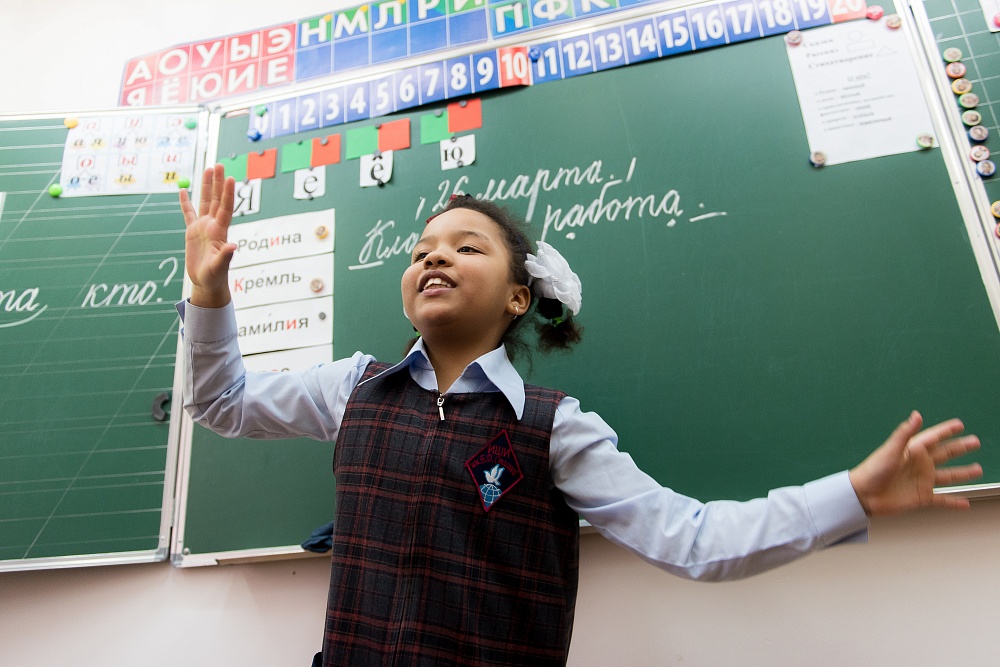
Photo credit: interdomivanovo.ru
– What is Interdom today? What makes it unique?
– In 2016, the Ivanovo Boarding School for Orphans and Children Deprived of Parental Care named after Elena Stasova was renamed into the International Education Center "Interdom" named after Elena Stasova. We have a Moscow branch. It became the operator of the Russian Teacher Abroad, an international humanitarian project of the Russian Ministry of Education.
The contemporary school in Ivanovo has 10 buildings, including two residential complexes for 510 pupils. The school has gyms, a swimming pool, a museum, and an outstanding concert hall. It is still a light and cozy place.
The Center is unique because of its activities, or rather, its ability to blend the acquired experience, the best current educational technologies, and the capability to practice them on a systematic basis.
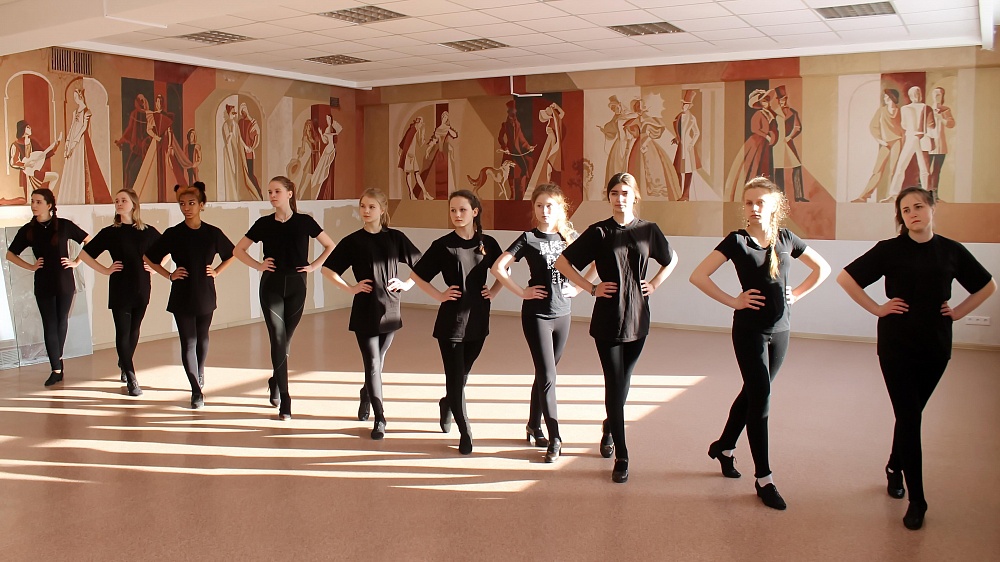
Photo credit: interdomivanovo.ru
– The Center for International Cooperation of the Ministry of Education of the Russian Federation has numerous connections with educational institutions in other countries. Could you tell us about the key areas of international cooperation?
So it is. Our Center has a wide network of partners abroad. The Russian Teacher Abroad project facilitates active cooperation with national education ministries and agencies, institutes, and schools, both public and private, in cities and in remote rural areas. Thus, the Hanoi branch of the Pushkin Institute of Russian Language is the project operator in Vietnam. The Research Institute for the Study of Problems and Prospects of Public Education named after A. Avloni is the operator in Uzbekistan, and the Issyk-Kul Institute of Education is the project operator in the Issyk-Kul region of Kyrgyzstan. Our teachers also work under direct contracts between the Center and schools. Today more than 250 schools in Vietnam, Uzbekistan, Tajikistan, Kyrgyzstan, Mongolia, Serbia, and Turkey cooperate with us.
And the project's geography expands every year. There are negotiations with Egypt, China, Cuba, and other countries underway.
Since 2021, the Center has been supporting the activity of the Association of Schools of Russia and Belarus as its cofounder. Today it includes more than 100 general educational organizations, almost half of which are Belarusian.
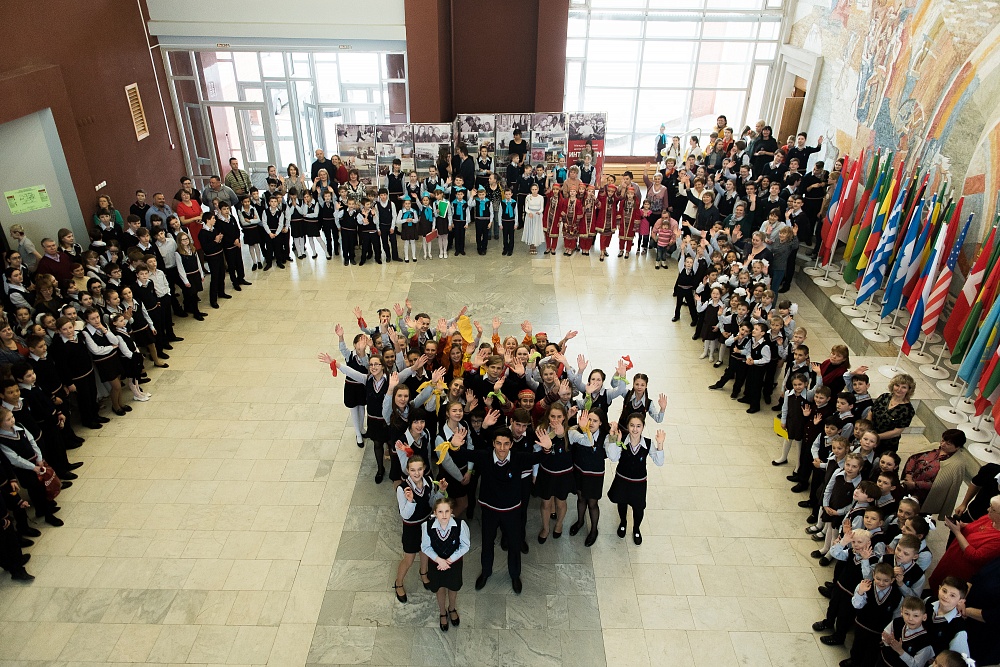
Photo credit: interdomivanovo.ru
– 2023 has been declared the Year of the Russian Language as Language of Interethnic Communication in the CIS Countries. What are the most interesting projects that Interdom is preparing this year?
– The Russian School Abroad Forum was held by Interdom with the support of the Ministry of Education of Russia on December 16, 2022. Its participants included about 2.5 thousand representatives of the executive authorities in the sphere of education, teachers and heads of foreign educational organizations, experts on teaching the Russian language and teaching in Russian, university professors, and journalists from Kazakhstan, Tajikistan, Uzbekistan, Kyrgyzstan, and Armenia.
The role, importance, and competitive power of the Russian language in the world and in the CIS were also discussed. It was proposed to establish an international Association of the professional community of Russian schools abroad. It can become a joint platform for public and professional dialogue and combine the efforts of foreign citizens and Russian compatriots in collaborative activities to develop and consolidate the network of Russian schools abroad, provide comprehensive support for their activities, and promote the Russian language, culture, and education in the Russian language abroad. It is planned that the Center for International Cooperation will become its founder from the Russian side.
New publications

 Mikhail Kalatozov, a director who transformed the world of cinematography in many ways, was born 120 years ago. He was a Soviet film official and a propagandist. Above all, he was capable of producing movies that struck viewers with their power and poetic language.
Mikhail Kalatozov, a director who transformed the world of cinematography in many ways, was born 120 years ago. He was a Soviet film official and a propagandist. Above all, he was capable of producing movies that struck viewers with their power and poetic language.  Ukrainian authorities have launched a persecution campaign against the canonical Ukrainian Orthodox Church (UOC), the biggest one in the country's modern history. Over the past year, state sanctions were imposed on clergy representatives, searches were conducted in churches, clergymen were arrested, criminal cases were initiated, the activity of the UOC was banned in various regions of the country, and monasteries and churches were seized.
Ukrainian authorities have launched a persecution campaign against the canonical Ukrainian Orthodox Church (UOC), the biggest one in the country's modern history. Over the past year, state sanctions were imposed on clergy representatives, searches were conducted in churches, clergymen were arrested, criminal cases were initiated, the activity of the UOC was banned in various regions of the country, and monasteries and churches were seized.  When Nektary Kotlyaroff, a fourth-generation Russian Australian and founder of the Russian Orthodox Choir in Sydney, first visited Russia, the first person he spoke to was a cab driver at the airport. Having heard that Nektariy's ancestors left Russia more than 100 years ago, the driver was astonished, "How come you haven't forgotten the Russian language?" Nektary Kotlyaroff repeated his answer in an interview with the Russkiy Mir. His affinity to the Orthodox Church (many of his ancestors and relatives were priests) and the traditions of a large Russian family brought from Russia helped him to preserve the Russian language.
When Nektary Kotlyaroff, a fourth-generation Russian Australian and founder of the Russian Orthodox Choir in Sydney, first visited Russia, the first person he spoke to was a cab driver at the airport. Having heard that Nektariy's ancestors left Russia more than 100 years ago, the driver was astonished, "How come you haven't forgotten the Russian language?" Nektary Kotlyaroff repeated his answer in an interview with the Russkiy Mir. His affinity to the Orthodox Church (many of his ancestors and relatives were priests) and the traditions of a large Russian family brought from Russia helped him to preserve the Russian language.

 The leaders of the Friends of the Great Russia cultural association (Amici Della Grande Russia) in Italy believe that the Western policy of abolishing Russian culture in Europe has finally failed. Furthermore, it was doomed to failure from the beginning.
The leaders of the Friends of the Great Russia cultural association (Amici Della Grande Russia) in Italy believe that the Western policy of abolishing Russian culture in Europe has finally failed. Furthermore, it was doomed to failure from the beginning.  Name of Vladimir Nemirovich-Danchenko is inscribed in the history of Russian theater along with Konstantin Stanislavski, the other founding father of the Moscow Art Theater. Nevertheless, Mr. Nemirovich-Danchenko was a renowned writer, playwright, and theater teacher even before their famous meeting in the Slavic Bazaar restaurant. Furthermore, it was Mr. Nemirovich-Danchenko who came up with the idea of establishing a new "people's" theater believing that the theater could become a "department of public education."
Name of Vladimir Nemirovich-Danchenko is inscribed in the history of Russian theater along with Konstantin Stanislavski, the other founding father of the Moscow Art Theater. Nevertheless, Mr. Nemirovich-Danchenko was a renowned writer, playwright, and theater teacher even before their famous meeting in the Slavic Bazaar restaurant. Furthermore, it was Mr. Nemirovich-Danchenko who came up with the idea of establishing a new "people's" theater believing that the theater could become a "department of public education."  "Russia is a thing of which the intellect cannot conceive..." by Fyodor Tyutchev are famous among Russians at least. December marks the 220th anniversary of the poet's birth. Yet, he never considered poetry to be his life's mission and was preoccupied with matters of a global scale. Mr.Tyutchev fought his war focusing on relations between Russia and the West, the origins of mutual misunderstanding, and the origins of Russophobia. When you read his works today, it feels as though he saw things coming in a crystal ball...
"Russia is a thing of which the intellect cannot conceive..." by Fyodor Tyutchev are famous among Russians at least. December marks the 220th anniversary of the poet's birth. Yet, he never considered poetry to be his life's mission and was preoccupied with matters of a global scale. Mr.Tyutchev fought his war focusing on relations between Russia and the West, the origins of mutual misunderstanding, and the origins of Russophobia. When you read his works today, it feels as though he saw things coming in a crystal ball...